

• MAY IS FOSTER CARE AWARENESS MONTH • YOUTH VILLAGES CELEBRATES 25 YEARS OF CHAFEE
• DONOR SPOTLIGHT: PARKS AUTOMOTIVE GROUP



• MAY IS FOSTER CARE AWARENESS MONTH • YOUTH VILLAGES CELEBRATES 25 YEARS OF CHAFEE
• DONOR SPOTLIGHT: PARKS AUTOMOTIVE GROUP

As we welcome the fresh energy of spring, we are reminded of the resilience and strength that define our work at Youth Villages. With each season, our community grows stronger and our commitment to the youth and families we serve deepens.
In 2005, Youth Villages responded to North Carolina’s efforts to reform mental health care. Since then, we have worked tirelessly to become a leader in children’s mental and behavioral health in the state. We grew from offering one in-home treatment service, to providing an array of services using proven treatment models that strengthen the child’s family and support systems dramatically improving their long-term success. Now, as we celebrate our 20th anniversary in this great state, we know by improving the lives of youth living through especially challenging circumstances, Youth Villages addresses an immediate social, economic and moral imperative while representing a striking opportunity for tremendous social impact.
The success stories of the young people we work with inspire us to push forward with even more dedication. Our commitment to meeting their needs — whether it’s mental health services, family support or helping youth transition to independence — remains at the heart of everything we do.
But our work wouldn’t be possible without the support of compassionate individuals like you. Whether through donations, volunteerism or simply spreading the word about the important work we do, you play a vital role in transforming the lives of youth across North Carolina.
As we look ahead, we are excited to continue building partnerships, raising awareness and working together to ensure every young person we serve has the tools and support they need to thrive.
Thank you for your unwavering support of Youth Villages!

Paul Enderson EXECUTIVE DIRECTOR
NORTH
CAROLINA
paul.enderson@youthvillages.org
865-560-2548
Erika Carney, Chair
Heather Bradshaw
Rachel Daigle
Cheddi Johnson
Christine Kahm Silver
Kelly McKinnon
Ross Pope
Lee Robertson
Steve Rook
Taylor Vaughn
Wilmington
Youth Villages is a national leader in mental and behavioral health committed to finding the most effective solutions to help children, families and young adults overcome obstacles and live successfully. Working through direct services, partnerships with innovative public agencies and advocacy, we collaborate to bring positive change to child welfare, children’s mental health and justice systems. Our 4,500 employees serve more than 43,000 children and young adults in more than 100 locations in 27 states and the District of Columbia. Youth Villages has been recognized by the Harvard Business School and U.S. News & World Report and was identified by The White House as one of the nation’s most promising results-oriented nonprofit organizations.
We’d love to hear feedback from you, so we can continue to improve and give you content you enjoy.
QR
to complete our survey.

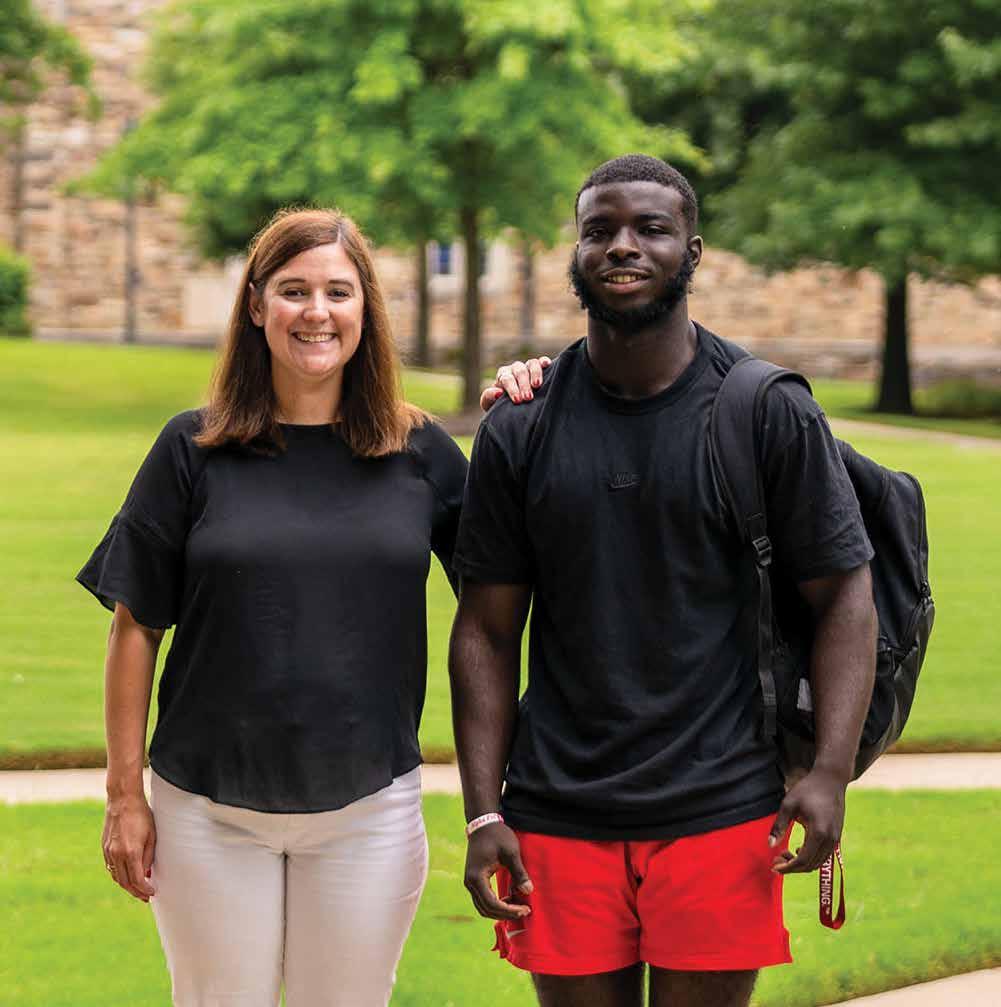
Youth Villages empowers youth to hope for a brighter future.
May is National Foster Care Awareness Month — a time to recognize the resilience of children and youth in the foster care system and the individuals who support them. In North Carolina, there are close to 15,000 youth in foster care, many of whom struggle with instability that causes disrupted educational experiences. As a result, youth in foster care are more likely to experience academic setbacks and higher dropout rates compared to their peers.
According to data from the National Working Group on Foster Care and Education, approximately 50% of foster youth graduate from high school within four years, and only 3%-4% of former foster youth obtain a fouryear college degree, a far lower percentage than the general population. In North Carolina, the statistics are similarly concerning, with many students in foster care facing barriers to success.
However, with the right support, these young people can overcome obstacles and succeed academically. Youth Villages is committed to
LifeSet Specialist Claudia Wilder and LifeSet Scholar Alpha Diallo find ways to move him towards independence.
ensuring youth who experienced foster care have access to the resources, guidance and opportunities they need to not only graduate from high school but also to pursue higher education, technical training and career opportunities. Through our LifeSet Scholars program, we provide personalized academic support to help these students stay on track.
At Youth Villages, we recognize the importance of secondary education as a key to unlocking opportunities for youth in foster care.
LifeSet Scholars provides additional help to young people in our LifeSet program who are attending college. Key components are mentoring, educational opportunities, support systems and other assistance as needed, all of which are designed to ensure these young people are not left behind. The program focuses on helping young adults who experienced foster care navigate the challenges of both secondary education and the transition to adulthood.
During Foster Care Awareness Month, it’s important to remember that education is not just about earning a diploma. Through LifeSet Scholars, Youth Villages is breaking the cycle of instability by helping youth who experienced foster care navigate secondary education, prepare for the workforce and ultimately create brighter futures for themselves.
As a community, we can all play a role in supporting these efforts. Whether through mentoring, donating to organizations that support foster youth, or advocating for policy changes that improve educational outcomes, we have the power to make a difference.
Every child in foster care deserves the opportunity to achieve their dreams, and with the right support, that opportunity is within reach. This Foster Care Awareness Month, let’s raise our voices in support of youth in foster care and ensure that every young person — no matter their circumstances — has the chance to succeed in school and beyond.
Thousands of children experience outof-home placements in North Carolina, and sometimes, finding a forever home isn’t an option before they age out of the system. Programs like LifeSet help young adults who experience foster care establish independence.
Jailyn grew up in an unsafe and chaotic environment.
She’d seen and experienced too much, and at 16, she had become a stranger to the concept of "home."
Since 2008, the North Carolina Department of Social Services had been in and out of her life. There were reports, cases and interventions, but nothing worked. Her home environment consisted of drugs, domestic violence and instability. School was hard enough, but on top of that, there was a very strict dress code. The only clothes she owned were sweatpants, which were not allowed. What she wore was the least of her concerns –– surviving and getting her education were her priority. At one point, DSS removed her from her father’s custody and sent her to stay
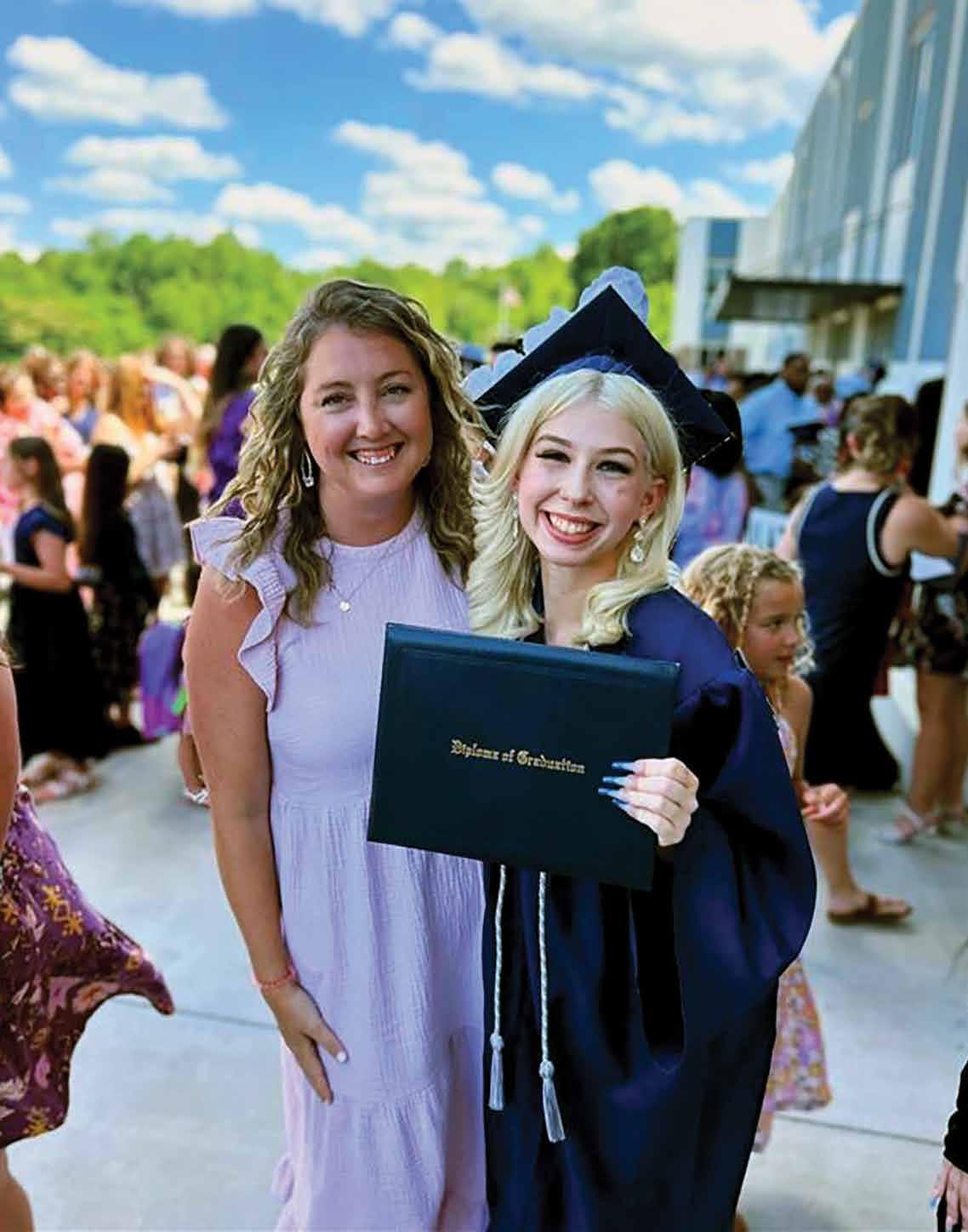

on being sober but fell back into addiction after only three months of Jailyn living with her.
As she faced challenges in school, Jailyn grew close to her school administrator, Mrs. West. One day, as students were being pulled into the office for breaking dress code, Jailyn told Mrs. West “This was all I had to wear to school today, and I’m here because all I want is my education.”

Jailyn and Mrs. West celebrate high school graduation.
Mrs. West made a deal with her; she would let her remain in her office rather than being sent home from school, but only if she agreed to do her schoolwork during that time.
During a snowstorm in 2022, things came to a head between Jailyn and her mother, who kicked her out of her home. There was only one avenue left for her to take: the foster care system.
Jailyn feared entering the foster care system, so she prepared to do what she always did, which was run. Running away was a common occurrence for her. Staying in hotels, jumping from house to house –– anywhere that was safer than home. But by the time DSS came around again, Jailyn had exhausted every option.
She explained her circumstances to Mrs. West, who talked Jailyn out of running and instead into coming home with her. Despite being distrustful of every adult around her, Jailyn took a chance and agreed. The first few months were incredibly hard for Jailyn. As time progressed, the West family began the process of officially becoming her foster parents.
“I stayed in my room a lot,” Jailyn said. “I didn’t want to be ‘saved’ or viewed as a ‘rescue puppy.’ There were still pieces of love and happy memories, mixed in with the pain of my childhood.”
Mrs. West and her family were patient. They didn’t push her. They let her know, every day, the door was open whenever she was ready.
Even though her foster family was great, Jailyn needed more than just a roof over her head. She needed support, guidance and to stand on her own two feet.
That’s when Jailyn’s social worker connected her with Youth Villages’
LifeSet program. She didn’t realize it at first, but the program would change everything. It wasn’t just a means for youth in foster care to get support — it was a bridge to something more: independence.
“At the end of the day, foster youth need extra [support],” Jailyn said.
Jailyn met Doria, her LifeSet specialist, someone who didn’t just give her advice but understood her. Doria’s life experiences mirrored Jailyn’s, which helped build a relationship of trust between them.
Now a LifeSet Scholar, studying baking and pastry arts at Johnson & Wales University, Jailyn is pursuing her love for pastry arts.
“My love for cooking stems from my dad,” Jailyn said. “Through the midst of all the craziness growing up, one thing we could all do as a family was get in the kitchen and cook together.”
experienced foster care can break cycles, overcome adversity and build a future. With the guidance of her foster family and Youth Villages, she is no longer just surviving –– she is thriving.

Jailyn is proof that with the right support system, youth who

Jailyn’s story is a testament to the power of showing up for those in need. Through the efforts of programs like LifeSet and the unwavering love of those who became her family, Jailyn has built a foundation for a future filled with possibilities.
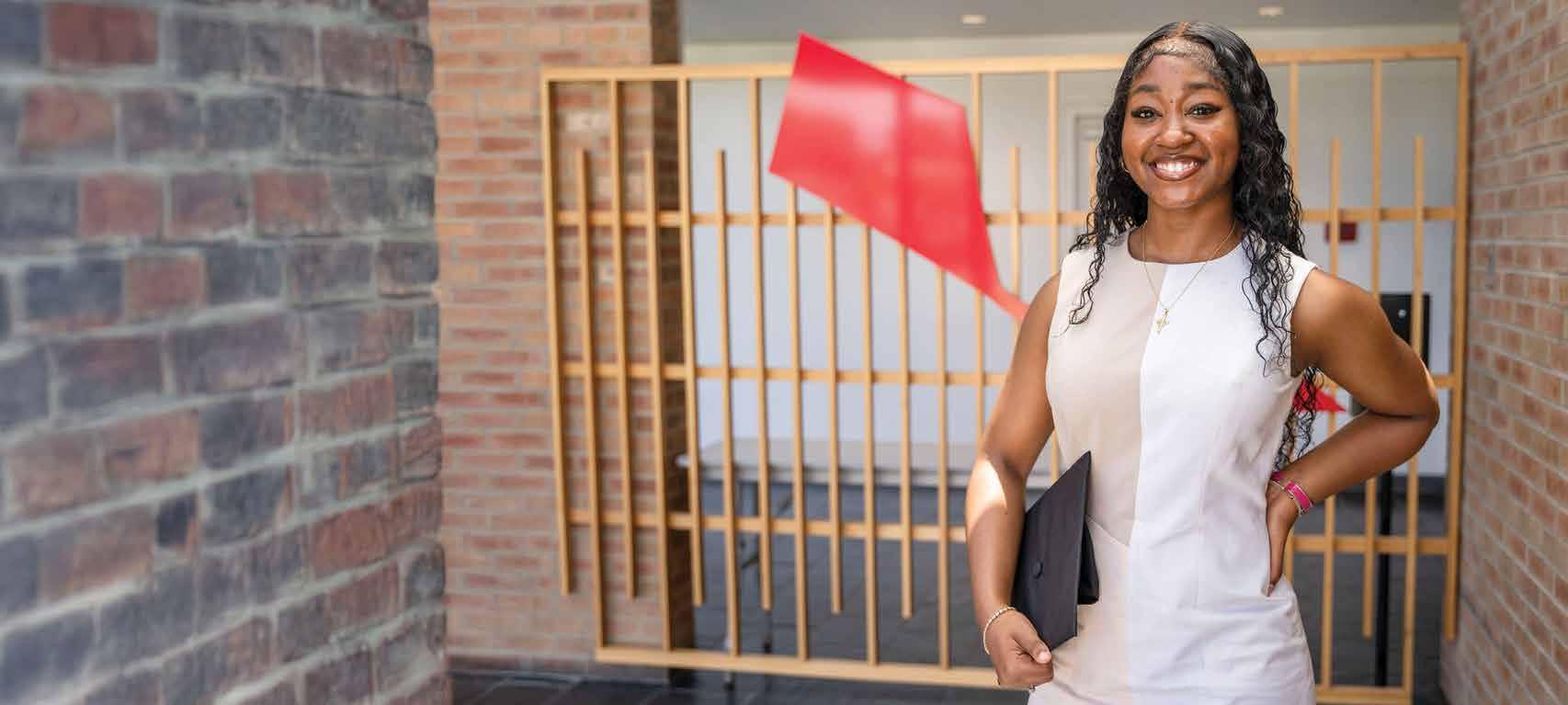
Join us in our first-ever Grads for Good campaign and express your school pride through support of our LifeSet Scholars!
In honor of our 20th anniversary, we aim to raise $20,000 for our growing LifeSet Scholars program. We currently have 44 scholars across the state but want to double that number over the next few years —
and we need your help! You can garner support from your local community and alumni networks and start conversations about the positive impact of the LifeSet Scholars program by starting your own fundraiser.
There are many ways to make a lasting difference in the lives of our scholars.
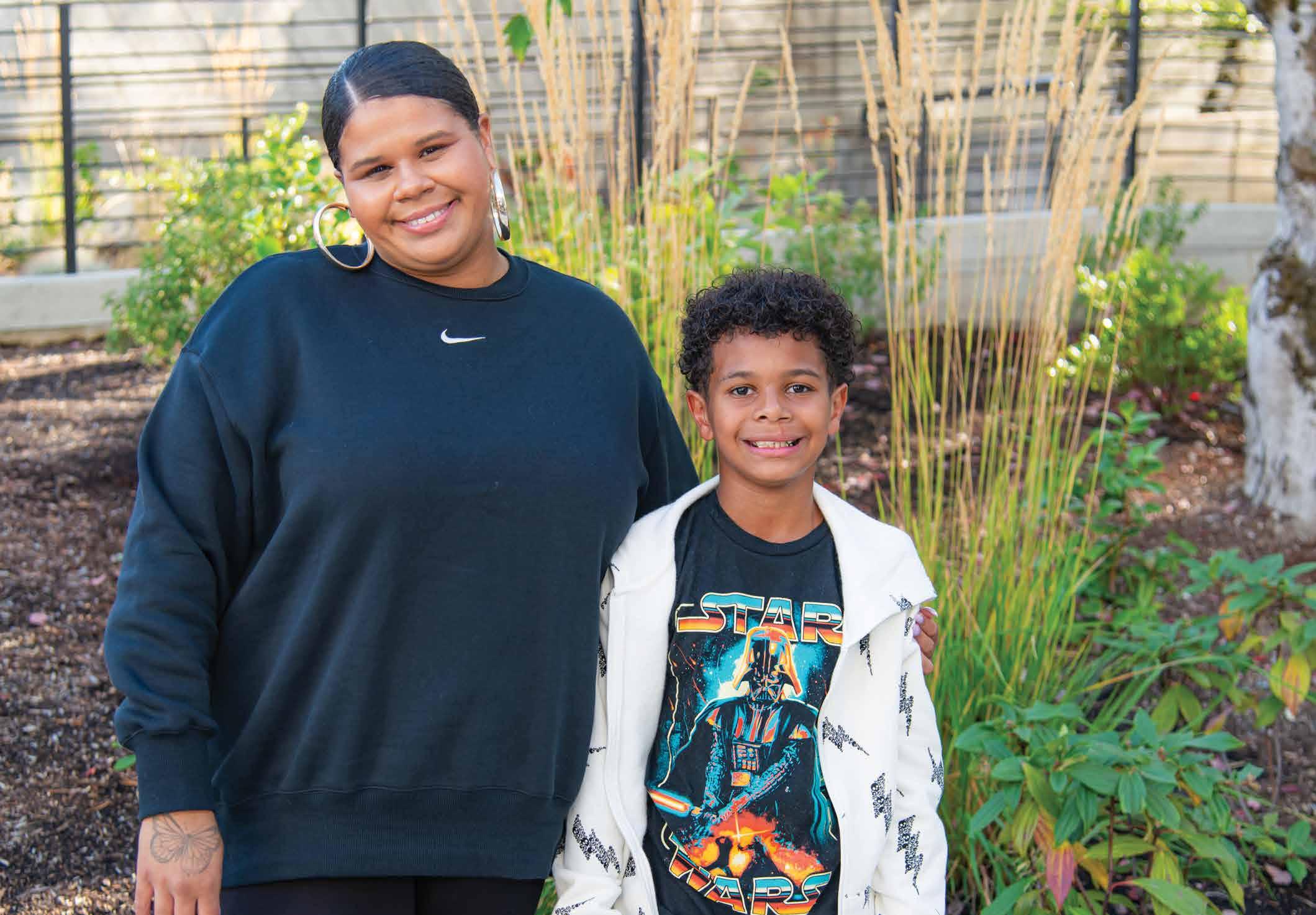
JASMIN AND KAYDEN REUNITED WITH INTERCEPT®
Every year in the United States, only half of the number of children who enter the child welfare system are reunified with family. When equipping parents and children with the proper resources and guidance, their family dynamic is more likely to thrive.
As a mother, Jasmin faced challenges and that lead to trauma for her family. Her son, Kayden, was removed from the home and put in foster care, where he remained for two-and-a-half years.
Determined to fight for her family, Jasmin received the treatment she needed to recover from substance abuse.
After months of receiving care at an in-patient facility and completing the steps to provide a stable home, Jasmin finally regained custody of her son. This motivated her to become the best version of herself and keep her family together.

“I decided to get the help I needed, and I decided not to run. I felt angry at myself and wanted to blame everybody, but I knew that wasn’t right.”
- JASMIN
Jasmin had uncertainties about whether she was ready for this next big step. Now nine years old, Kayden’s transition back into his mother’s home was rocky, and he started exhibiting suicidal language and behavioral challenges. Jasmin says he would frequently lash out.

She was referred to Youth Villages’ Intercept program, which made the process easier for Jasmin and Kayden, but communication would be the key to their success.
Riley, the family intervention specialist, quickly stepped in to help ease the burden the family was experiencing. They worked on regulation techniques, and Riley encouraged Kayden to be creative in his skills to manage emotions.
Riley worked with Kayden on communicating through an intervention technique called an emotional thermometer, a visual tool used to help youth understand and identify their emotions.
“We also used the Youth Villages crisis line a couple times just in case, and it has worked really well for our family,” Jasmin said. “The crisis counselor was amazing and supportive.”
She said the support was integral in their family’s success and provided her with a much-needed confidence boost, too.
The small-but-mighty duo are now living together in an apartment and, like any family, enjoy cooking, watching TV, playing in the park and eating ice cream.
“I want Kayden to be safe and happy,” Jasmin said. “I want him to thrive.”


For two decades, Youth Villages North Carolina has been dedicated to providing compassionate care and unwavering support to help children and families overcome life’s toughest challenges.
From early intervention programs to life-changing services, we’ve been there through every step of the journey. But
OCT. 8, 2025 5:30-7 P.M.
The Grove, 208 Wolfe St. Raleigh, North Carolina 27602
RSVP to April Vahey at april.vahey@youthvillages.org
our mission is far from over. With your support, we can continue to make a lasting impact for the next generation.
Be part of this milestone celebration and help us build a brighter future.
Together, we’ve made a difference, and together we’ll keep changing lives.
Chafee, the federal funding stream that provides services to young adults who age out of foster care, now includes additional funds to receive post-secondary education and job training.

Young people who age out of foster care services at 18 experience serious challenges as they make their way in adulthood. Providing support, opportunity and resources for them is a core mission of Youth Villages and our supporters.
Recently, young people who participate in Youth Villages transition-age services — the LifeSet program, extended foster care and independent living programs — were in Washington, D.C., to take part in a celebration of the 25th anniversary of federal support for current and former foster youth through the John H. Chafee Foster Care Program for Successful Transition to Adulthood program.
Thirty-five young people from 13 national organizations went to D.C. for two days of meetings themed: Our Voices, Our Vision — Policy Solutions. Young people advocated for a focus on healing, lifelong family connections and increased economic opportunities. The event was sponsored by the Journey to Success Campaign and partnering organizations, including Youth Villages. The young people are part of multigenerational advocacy that has brought about support and funding for transition-age youth. In 1999,
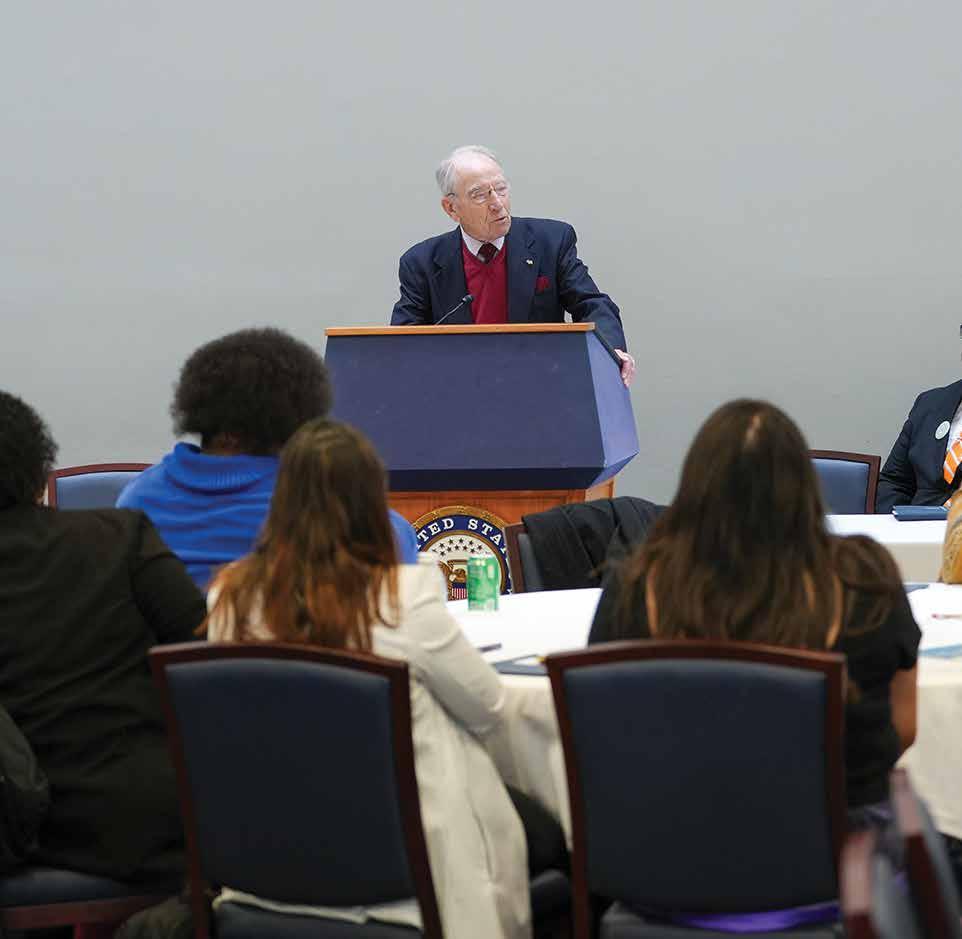
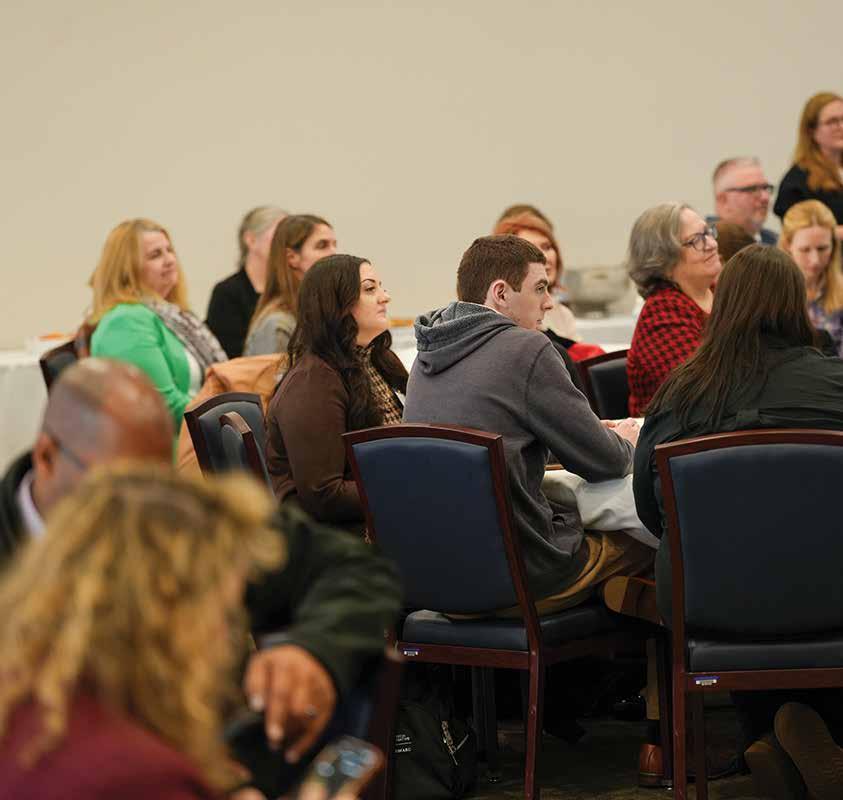
U.S. Senator Charles Grassley (R-Iowa), founder and chair of the Senate Caucus on Foster Care, speaks to young people and advocates.
young people were influential in the passage of the John H. Chafee Foster Care Program for Successful Transition to Adulthood. Funded by $143 million in 2024, the Chafee program is still the primary federal funding stream that states use to provide services to young adults who age out of foster care systems.
The Chafee program now includes additional funding for young adults to receive post-secondary education and job training. The National Youth in Transition (NYTD) database that collects information and outcomes on youth and young adults currently or formerly in foster care is also funded by the Chafee program.
U.S. Senator Charles Grassley (R-Iowa), founder and chair of the Senate Caucus on Foster Care, and U.S. Senator Amy Klobuchar (D-Minn), caucus member, spoke to the young people.
Grassley traced his decades of advocacy for foster youth to one
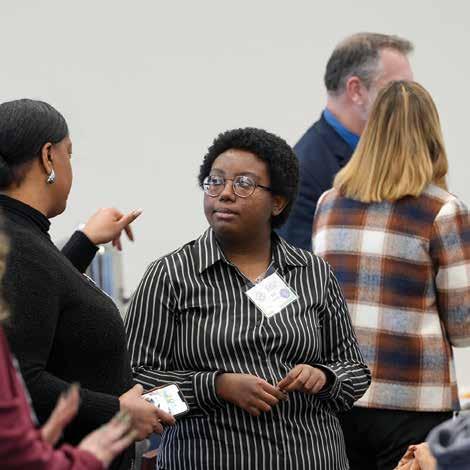
young staff member named Sarah who had been adopted and brought foster care issues to his attention.
“Your advocacy is very important,” Grassley told the young people. “My inspiration to work on these issues came from young people who experienced foster care, and you continue to inspire me today.”
He said the Senate Caucus on Foster Care began in 2008 to create an avenue for youth advocacy and bipartisan collaboration on these issues.
“We’ve been very successful in getting things done,” Grassley said. “But there are some issues we still need to work on.”
Youth Villages is advocating for an increase in Chafee funding to ensure that all 50 states can expand services to former foster youth to 21. Other bills would extend services to 26, an age when most parents are still providing financial support to their children.
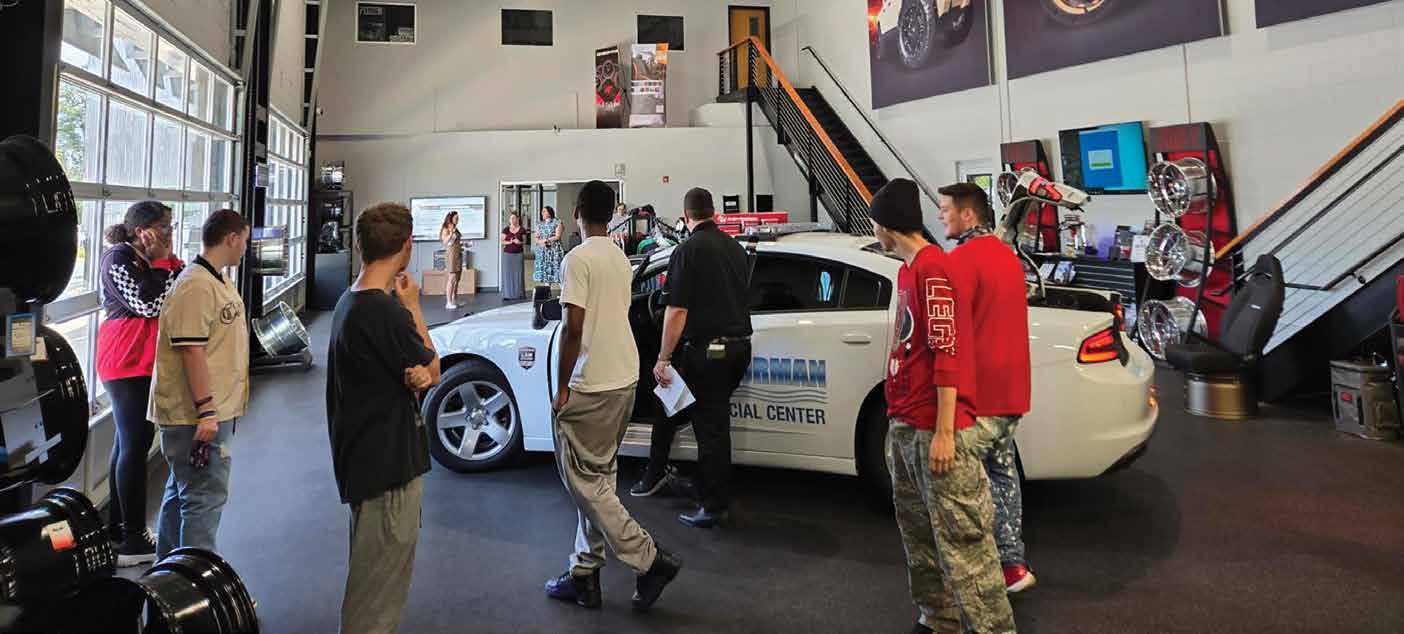
Parks Automotive Group shares their drive to support Youth Villages
How did Parks Automotive Group become involved with Youth Villages?
Parks Automotive Group has successfully built upon the strong foundation established by our previous ownership, continuing to foster and strengthen the exceptional relationships they cultivated over time with Youth Villages.
Why does Parks Automotive Group personally support Youth Villages with their philanthropic investment?
Parks Automotive is guided by core values that shape our organization and drive our mission of improving lives with every interaction. This aligns perfectly with the values and mission of Youth Villages, which is dedicated to helping children and families thrive. Both organizations share a common goal of making a meaningful impact and enhancing the lives of others.
What is one story or moment that sticks with you about Youth Villages’ work with young people?
There have been countless memorable moments, from donating our office space as the Holiday Heroes workshop
Young adults visit the shop at Parks Automotive Group to learn about car care and potential careers in the automotive industry.
to connecting with the staff and interacting with the young adults. It's tough to pick just one, but one that stands out the most was when we had the opportunity to engage with the LifeSet participants who visited our automotive shop to learn about caring for their future vehicles. Their curiosity, excitement, gratitude and humility in wanting to learn the basics was truly inspiring. It was a moment that felt incredibly rewarding, knowing we were able to make a real impact and help improve their lives in a meaningful way.
Why should other companies consider becoming involved with Youth Villages?
Supporting Youth Villages goes beyond just a financial contribution — it’s an adventure! It’s about actively participating in events, giving your team the opportunity to make a difference, and allowing them to experience those rewarding, "do good" moments. It’s the chance to connect, give back and feel the impact of your actions in a way that truly resonates with everyone involved.
What would you say to encourage others to financially support Youth Villages?
Winston Churchill once said, "We make a living by what we get, but we make a life by what we give." Supporting this organization truly embodies that idea, as giving to those in need creates a lasting impact and changes the lives of those who need us most. It’s through our contributions we can make a real difference for the children around us!
JULY 1 – DEC. 31, 2024
$100,000+
Leon Levine Foundation
The Joey Logano Foundation
Weaver Foundation, Inc.
$50,000 to $99,999
Blue Cross Blue Shield of North Carolina
The WHH Foundation
$25,000 to $49,999
The Community Foundation of Western North Carolina, Inc.
Evergreen Foundation
United Way of Greater Triangle
$10,000 to $24,999
Kevin Kiernan
Novant Health
Speedway Children’s Charities
United Bank
$5,000 to $9,999
Bertsch Family Foundation
Sara and Brian Boehm
Carolina Complete
Rachel and Adam Daigle
DNA Property Management LLC
Public Sector Group, LLC
Weyerhauser Giving Fund
$1,000 to $4,999
Jesica Averhart
Whitney Balzer
Zach Britt
Elizabeth Buffkin
Ashley and David Burke
Christopher Carney
Erika and Robby Carney
Pia and Wyatt Chocklett
Bradley Curelop
Durham Exchange Club
Shelley Eatherly
Erica and Steve Ellis
Sandi and Len Eskew
Claire and Russ Ferguson
Betty Forrest
Leeann and Mark Garms
Ross Hartney
Natalie and David Homesley
Amy and Dave Jacobs
Loweth-Alvord Foundation
Debbie McManus
Midtown Property Law
Posey and Mark Mealy
John Parker
Caroline and Ross Pope
Zach Prager
George David Rahal
Kaila Ramser
Dexter Richardson
Megan Shook
Christine Kahm Silver and Perry Silver
Marc Sinacori
The Soo Foundation, Inc.
Russell Tedder
Rich Tucker
April and Brian Vahey
Carmel and David Vahey
Pamela and Darryl Wade
Gary Wolfe
Thomas Wolfe
Sara Wright
Thank you to those who already committed to a three-year pledge as part of our Growing Stronger campaign and are now part of the Champions for Children Circle as of June 2024!
LEADER
Debbie and Allen Campbell
DNA Property Management
Kevin Kiernan
PROTECTOR
Mary and Steven Boehm
Sara and Brian Boehm
Zach Britt
Chris Carlino
Mike Kavanagh
Caroline and Ross Pope
Tracy and Doug Miskew
William Quinn
Phil Rotella
Robin and Jack Salzman
Sarah and Taylor Vaughn
BUILDER
Jesica Averhart
Whitney Balzer
Elizabeth Buffkin
Ashley and David Burke
Jackie Burke
Lori Bush
Jack Butler
Zach Britt
Christopher Carney
Erika and Robby Carney
Sue and Scott Carpenter
Nadine Cheek
Pia and Wyatt Chocklett
Stacey and Bradley Curelop
José Diaz
Betsy and Jim Edmonds
Sandi and Len Eskew
Leeann and Mark Garms
Catherine Hamlin
Ross Hartney
Natalie and David Homesley
Julianne Howard
Amy and Dave Jacobs
Theresa Jurgensen and Chris
Jackson
Carissa Kohn-Johnson
Kristy Kent
Kathryn Kissam
Midtown Property Law
Tia McLaurin
Debbie McManus
Posey and Mark Mealy
Vivian Munson
John Parker
Spencer Pierce
Ashley Pizzo
Ashton and Stephen Powell
Zach Prager
Reese and Ian Rahilly
Kaila Ramser
Todd Reider
Dexter Richardson
Lee Robertson Jr.
Steve Rook
Phebe Shirley
Megan Shook
Christine and Perry Silver
Dawn and Marc Sinacori
Moira Smulien and Chris Marshall
Russ Tedder
Rich Tucker
Rebecca and Quentin
Watkins
Gary Wolfe
Annie and Thomas Wolfe
Sara Wright
Leigh and David Young
*If you made a contribution during this time (above $1,000) but it is not listed, please call 704-510-5601.
THERE ARE NUMEROUS WAYS YOU CAN MAKE A DIFFERENCE FOR CHILDREN AND FAMILIES IN YOUTH VILLAGES’ PROGRAMS.

GET INVOLVED
Volunteer individually or with a group
Contact Justin Franklin at justin.franklin@youthvillages.org
STAY IN TOUCH ONLINE
x.com/youthvillages
instagram.com/youthvillages facebook.com/youthvillages
youtube.com/youthvillages linkedin.com/company/youth-villages
Your generous contribution will support the families and young adults we serve and help us grow our impact! There are many ways you can make a monetary donation.
1. GIVE A ONE-TIME OR MONTHLY GIFT ONLINE AT YOUTHVILLAGES.ORG/DONATE
Select North Carolina from the drop down. Become a Champion for Children with a gift of $1,000 or more.
2. SEND A CHECK IN THE ENVELOPE INCLUDED OR MAIL TO:
Youth Villages North Carolina
Attn: Erica Ellis, Director of Development 8604 Cliff Cameron Dr., Suite 152, Charlotte, NC 28269
3. RECOMMEND A GRANT FROM YOUR DONOR ADVISED FUND THROUGH YOUR FUND ADMINISTRATOR
When granting through your DAF, use this information: Tax ID: 62-1652079
Mailing Address:
Youth Villages, Attn: North Carolina 3320 Brother Blvd., Memphis, TN 38133
Please advise Erica Ellis if you make a DAF gift to ensure it directly supports youth in our state.
4. GIVE A GIFT OF STOCK
Youth Villages Fidelity DTC Number: 0226 Account Number: Z73888583 Attn: For North Carolina
Have your stock advisor notify Erica Ellis about your gift at erica.ellis@youthvillages.org to ensure it directly supports youth in our state.
5. FROM YOUR IRA
If you are 70½ or over, you can give any amount (maximum up to $100,000) per year from your IRA directly to a qualified charity such as Youth Villages North Carolina without having to pay income taxes on the money. Gifts of any value of $100,000 or less are eligible for this benefit and you can feel good knowing you are making a difference. This popular gift option is commonly called the “IRA charitable rollover,” but you may also see it referred to as a “qualified charitable distribution” or QCD.
Questions about donating or designating a gift?
Erica Ellis, Director of Development of North Carolina erica.ellis@youthvillages.org or 704-510-5601
8604 Cliff Cameron Dr., Suite 152
Charlotte, NC 28269
(Address Service Requested)
Youth Villages is a private nonprofit that serves more than 43,000 children and their families each year from the following cities and states:
Alabama: Auburn
Arizona: Phoenix
Arkansas: Fayetteville, Little Rock
Florida: Lakeland
Georgia: Atlanta, Douglasville
Indiana: Bloomington, Columbus, Indianapolis
Kentucky: Lexington, Louisville
Louisiana: Metairie
Maine: Portland
Massachusetts: Boston, Marlborough, Springfield, Raynham, Woburn
Mississippi: Biloxi, Greenwood, Hattiesburg, Hernando, Jackson, Meridian, Tupelo

New Hampshire: Manchester, Plymouth
North Carolina: Asheville, Boone, Charlotte, Fayetteville, Greensboro, Greenville, Louisburg, Raleigh-Durham, Waynesville, Wilmington
Ohio: Dayton, Worthington
Oklahoma: Oklahoma City, Tulsa
Oregon: Bend, Portland, Salem
South Carolina: Columbia, Rock Hill
Rhode Island: Providence
Tennessee: Chattanooga, Clarksville, Columbia, Cookeville, Dickson, Dyersburg, Jackson, Johnson City, Knoxville, Memphis, Morristown, Nashville, Paris
Washington, D.C.